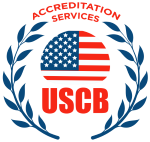ACCREDITATION SERVICES
What is accreditation
Accreditation determines the technical competence, reliability and integrity of Conformity Assessment Bodies. It spans all aspects of our everyday lives to provide confidence that accredited organisations are competent and can be trusted to deliver promised levels of performance and protection for the products and services we rely on.
Organisations check conformity and compliance with standards and regulations through testing, verification, inspection and calibration. USCB accreditation elevates the credibility of test results, ensures the reliability of measurements, enhances the reputation of certified activities, and ensures inspected equipment and processes can be relied upon to operate safely and accurately.
Accreditation drives confidence in all sectors by underpinning the quality of results, ensuring their traceability, comparability and validity. USCB accreditation ensures the highest levels of impartiality, objectivity and competence through the continuous assessment process, delivered by highly competent assessors and technical experts in all fields.
Summary of Standard used for accreditation
- Summary of standards used for accreditation
- ISO/IEC 17025: Testing & calibration laboratories
- ISO/IEC 17021-1: Certification of management systems
- ISO/IEC 17024: Certification of persons
- ISO/IEC 17065: Certification of products, processes & services
- ISO/IEC 17020: Inspection bodies
- ISO 15189: Medical laboratories
- ISO 22870 (in conjunction with ISO 15189): Point-of-care testing (POCT)
- ISO 15195 (in conjunction with ISO 15189): Medical reference measurement laboratories
- IQIPS: Improving Quality in Physiological Services
- QSI: Quality Standard for Imaging
- BS 70000: Medical Physics and Clinical Engineering services (MPACE)
- ISO/IEC 17043: Proficiency testing (PT) providers
- ISO 17034: Reference material producers
- ISO/IEC 17029: Validation and verification bodies
- ISO 14065 & ISO 14064-3: Validation and verification of environmental information including greenhouse gas (GHG)
- Accreditation of Approved Bodies (GB) and UK Notified Bodies for the NI market
- I’m looking for a new area for development
What is Certification
-
Effectively, certification is the third-party confirmation via audit of an organisation’s systems or products, whilst accreditation is independent third-party recognition that an organisation has the competence and impartiality to perform specific technical activities such as certification, testing and inspection.
Just as end user organisations have to demonstrate their conformity with a set of criteria to a certification body in order to be certified, in turn certification bodies have to demonstrate their competence, impartiality and integrity to USCB in order to be accredited. In other words, if certification bodies are ‘the checkers’ then USCB’s role as the government-appointed National Accreditation Body is to ‘check the checkers’.
It follows that only certification bodies can refer to themselves as ‘accredited’, whereas the organisations successfully audited by certification bodies hold ‘certification’. If the certification body has been accredited by USCB to audit that particular activity, then organisations successfully audited by that certification body hold ‘accredited certification’.
USCB Certificate Verification database of accredited certification
USCB has developed CertCheck, a free-to-use online database that allows all users to independently verify USCB accredited management systems certification.
The purpose of USCB Certificate Verification is to provide quick and simple assurance that a user’s supplier holds valid and current certification, ensuring a robust supply chain.
USCB Certificate Verification can be accessed here and contains over 300,000 management system certifications issued world wide by USCB accredited certification bodies.



